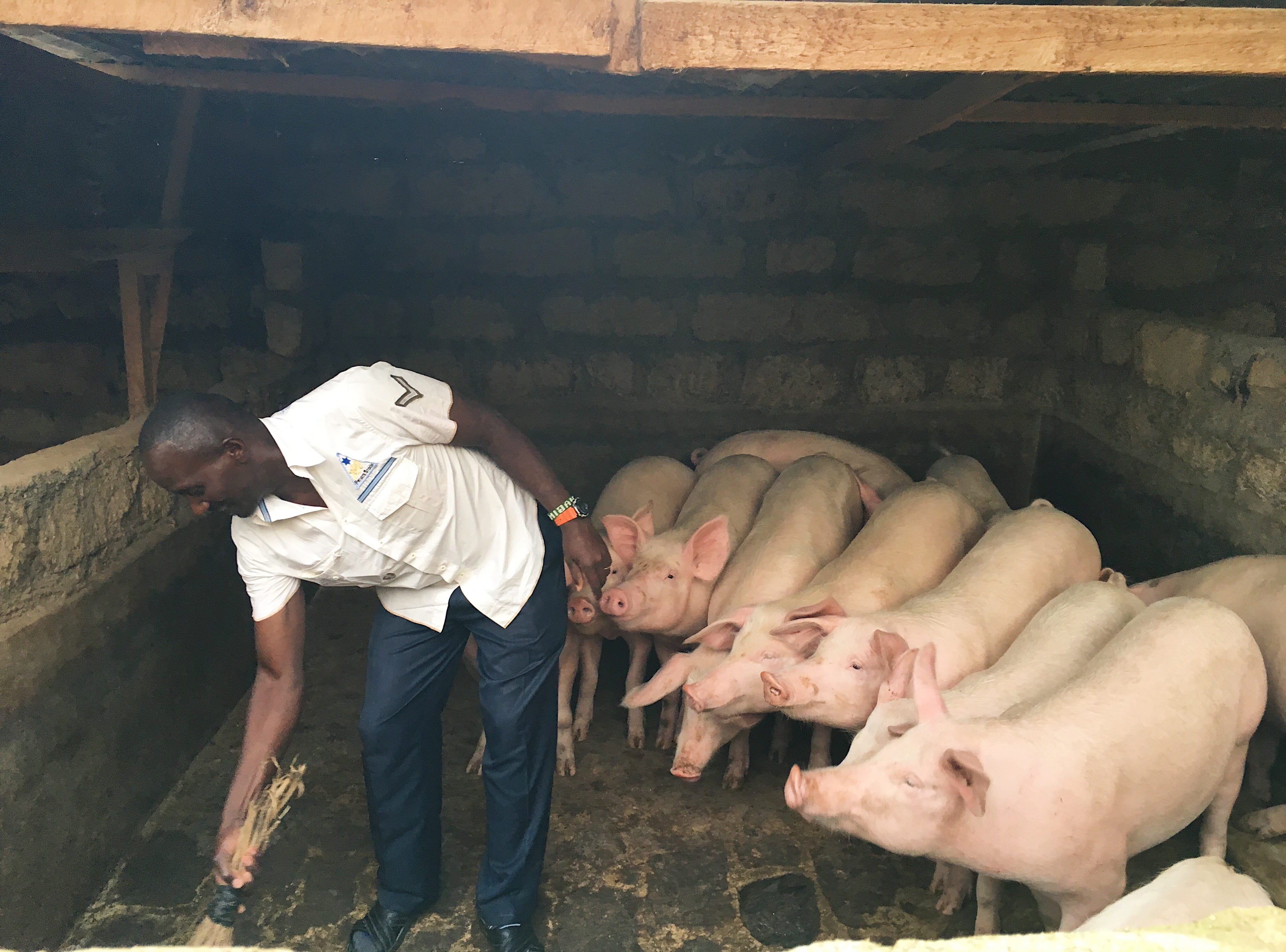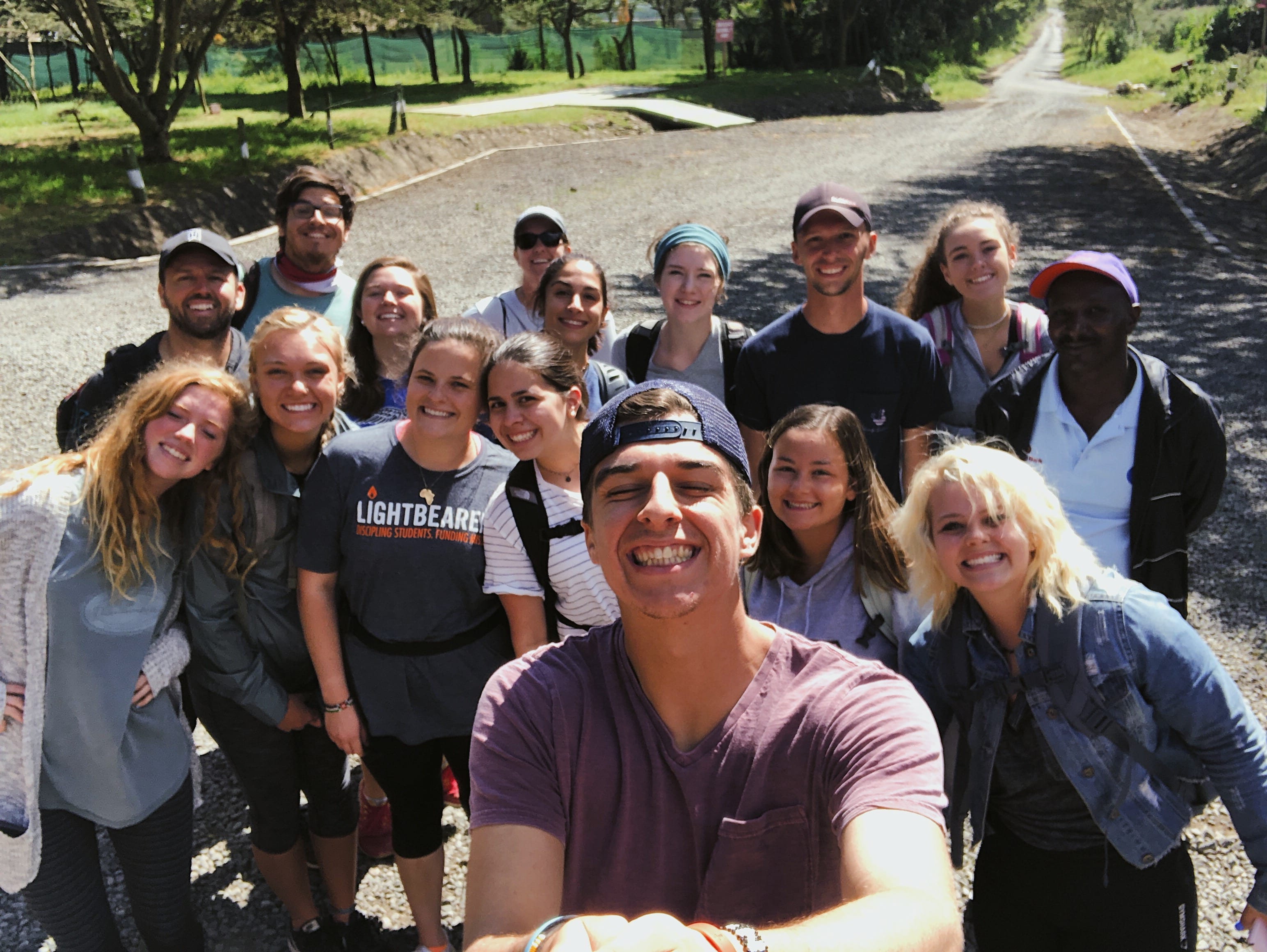Americans view careers a little differently than people like Charles Gitau Muhia, a Kenya native. Americans tend to chase wealth and prestige, whereas Charles’s goal is to make just enough money to live – however many jobs that might take.
By Ella Ruth Hill
He gets up at 6 a.m. each day to milk his cows, both of which are unnamed. He feeds his 45 pigs, which he will later sell to Farmer’s Choice Limited, a Nairobi supermarket. He cleans the pig pen, washes his car and starts his drive up the hill by 7:15 a.m. to pick us up by eight.
Charles Gitau Muhia grew up in Kijabe Town. Now 47 years old, he’s never left Kenya. He’s married with four children, and he spends his days making money, whether that be through driving his “matatu,” or public vehicle, raising his pigs, selling fresh milk to his neighbors or working at the shop down the street that his wife runs.

Charles Gitau Muhia feeds a giraffe July 20 at the Giraffe Center in Nairobi, Kenya. Photo by Ella Ruth Hill
I first met Charles in the summer of 2017 on a two-week trip to Kenya. In summer 2018, the six of us – Caroline, Austin, Josh, Miranda, Joey and I – returned for the summer to serve with Love Africa Mission, a college ministry based in North Carolina. We hired Charles again to drive our teams around Kijabe, Mai Mahiu, Naivasha and Nairobi. During almost every drive I sat in the front of Charles’s matatu in a small middle seat right next to him, so close that my knee rubbed against the gearshift. We talked about his family and why he has so many pigs. I practiced my Swahili, and he taught me a few words in Kikuyu, his tribal language. He speaks in broken English, but after a summer of talking to “wazungu,” or white people, he improved.
A lot of my conversations with Charles included employment in Kenya, which is a necessity – a non-negotiable for survival. Education, however, is moreso something that is envied and prized, even viewed as a luxury to some. It’s not uncommon to see elementary-aged children cutting class to help their parents earn money, often because school fees are too expensive.
For the majority, there isn’t time to pursue a career in their preferred field, especially for the roughly 50 percent of Kenyans without a primary education. Charles started off pursuing a career as a mechanic but was unable to complete the necessary schooling that the job required. By age 30, he had started driving and now runs multiple business ventures.
I witnessed for a summer the vast difference between American and Kenyan career goals: Americans focus on making the most money, while Kenyans focus on making enough money.
According to Trading Economics, the Kenyan unemployment rate in 2017 was 11.5 percent. In the same year, unemployment in the U.S. was around 4.4 percent, according to the U.S. Bureau of Labor Statistics. Landing a career amidst a poor economy and job market is difficult, even with Kenya’s unemployment rate being at its lowest since 2008. But the first obstacle is getting the right education.
About 22.4 million students in the U.S. are expected to enter college in 2019, a 17 percent increase from 2008, according to the National Center for Education Statistics. The U.S. labor force is projected to reach 163.5 million in 2022, which indicates an annual growth rate of 0.5 percent, according to the U.S. Bureau of Labor Statistics.
And it doesn’t appear that U.S. college graduates are having as much trouble finding employment. The U.S. employment rate for 20-24 year olds with a bachelor’s degree or higher education in 2016 was 86 percent, according to the National Center for Education Statistics.
As I enter my final year of college at the University of Arkansas, I have the opportunity to pursue a career in a self-serving culture. The latest American Dream is to make it as a solo entrepreneur, go vlog viral, earn enough Instagram followers to get sponsored, or be your own boss. Sleep is replaced with caffeine or late nights watching makeup tutorials. High-quality friendships are replaced with prestigious business connections.
Being the youngest of three adds more pressure as well. Both of my brothers are well into their careers in sales and real estate, and I’m the last in the family to add to – or take away from – that success. Somehow, the idea of quaint Kenyan living seems to look better and better. The inability to not chase my dreams, while dismal, seems easier.
Charles’s house is full of eight couches covered in mint-green drapes. Four rectangular coffee tables, each pushed together to form one dining table, fill the living room. A small TV sits in the corner. The windows have long, army-green drapes, and the walls are lined with Christmas lights, family photos and charts of vowel sounds. By Western standards, his home is small and quaint. But in Kenya, he’s living easy.
His house is five times the size of most 32-square-foot Kenyan homes. His land doubles that, with room for his cows and self-built pig pens. He also opened Southern Kijabe Muugi Academy in his town in 2013 after he noticed that children in his community were not accommodated well enough. With his own money, he built the school and now pays all student fees, teacher salaries and daily lunches out of pocket.
Charles invited us to his house for dinner nearly every day of the summer. When I sat next to him in his car, he said, “When are you coming to my house?” The day came, and his 8-year-old son Joseph ran out to us with one shoe on and walked us to the door. Charles gave us a tour of his land and introduced us to his family. He showed us the pig pens that he built, and he taught me how to milk his cow.

On July 1, Charles Gitau Muhia cleans the pig pen he built beside his house. Photo by Ella Ruth Hill
We gathered around his living room, each with a whole couch to ourselves, and his niece Ruth made her way to me with a pitcher of water and a large bowl. She slowly poured the warm water over my hands as I rubbed them together quickly so as not to waste water. Charles’s wife, Alice, carried large serving bowls and spaced them out evenly among the four coffee tables. I stood up to grab a plate and join the line, grabbing two servings of chapati, similar to a thick tortilla, as Charles stood over us and explained what each dish contained: cabbage, beans and goat stew. His two youngest children, Joseph and Jane, followed after us. After we left that night, he continued to invite us to come again.
“For you to make a living, you need a job,” said Jennifer Wayua Muga, manager of Moffat Bible College Guesthouse in Kijabe.
Moffat is the hostel-like location where anyone in the area, but especially missionaries or students, stay throughout the year. Muga is in charge of the full spectrum of duties around Moffat, including customer care, room assignment and upkeep, cleaning, laundry and cooking for large teams that stay for the summer. She does it all with three kids and a working husband.
“Unless you have a business, you won’t make it,” she said. In the Kijabe area, only family members are hired within small businesses. Therefore, almost everyone who works in Kijabe is from Kijabe, and there is little diversity.
Throughout the summer, the burden of what I will be doing a year from now hit me in waves. People asked more often than I’d hoped: What do you want to do?
Bestselling author Jeffrey J. Selingo explains the transition into adulthood as one of three types of people: Sprinters, Wanderers or Stragglers. According to a survey conducted for his book “There Is Life After College,” Sprinters, around 35 percent of young adults surveyed, entered their career immediately after college, and 97 percent were employed in their field of study. Wanderers, around 32 percent of young adults, took more time to start their careers after finishing college, and only 20 percent were employed in their field of study. Stragglers, around 33 percent of young adults, graduated high school and then took time off from school or enrolled part time in a college, and 99 percent hadn’t earned a college degree by their mid-twenties.
In the U.S. nearly 90 percent of adults have at least a high school diploma or GED, and more than one-third have a bachelor’s degree or higher, according to the U.S. Census Bureau’s 2016 report. In 2019, master’s degrees are projected to have increased by 34 percent since 2007 and doctor’s degrees by 54 percent, according to the National Center for Education Statistics. It seems as if U.S. college students want to go to school forever, whether that be through delayed graduation or extending education into graduate school.
In Kenya, the statistics are a little different. According to education data by Nation Newsplex, 58 percent of Kenyan students enrolled in first grade in 2004 did not end up graduating high school in 2015. Charles stopped going to school after eighth grade. There is a country-mandated test, called the KCPE (Kenya Certificate of Primary Education), which students take after eighth grade. The test is similar to the ACT or SAT and determines where students will attend high school. If their scores aren’t good enough, their education ends there. Charles said that if you don’t go to secondary school, it’s much more difficult to get a visa. Therefore, he has never been to the U.S., much less outside of Kenya.

Charles Gitau Muhia and the Love Africa Mission team pose for a selfie June 21 before hiking Mount Longonot. Photo courtesy of Austin Panter
With only one more year of school left, college seniors are soon to enter a season of dream chasing and enduring a pressure to be the best and earn the most, myself included. It seems like there is a career fair, resumé review session or internship opportunity email in my inbox every week. The everyday questions asked on campus or at a family dinner are the kind Kenyans rarely think to ask: “What do want to do with your degree?” “Where do you want to live after graduation?” “Have you thought about grad school?”
A few years ago, a mentor told me that “a wealth of opportunity is a poverty of attention.” I get it now. There are so many choices and opportunities for college students to pursue after graduation – so many that it’s overwhelming. I think some twenty-somethings would agree with me. A job right out of college sounds good enough to me.